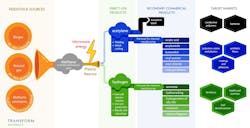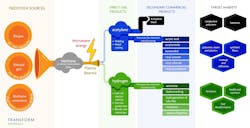Technology Converts Natural Gas Into Chemical Building Blocks
Transform Materials' technology replaces traditional chemical manufacturing and distribution.
At hydraulic fracking wellheads, natural gas is often flared instead of collected due to its low value — a colossal waste of a natural resource and a significant increase in harmful greenhouse gases, according to Transform Materials. The company says it is converting this abundant resource into two important chemical building-blocks. Rather than use crude oil to make the building blocks for essential products like plastics and pharmaceuticals, Transform Materials' process reportedly uses the methane in natural gas, converting it into high-value hydrogen and acetylene using microwave plasma technology.
Transform Materials breaks down methane and other similar light hydrocarbon gases without oxygen, recombining the resulting fragments into two high-value end products, acetylene and hydrogen. The key to this transformation is a microwave plasma reactor system that generates these new products from methane efficiently at very high rates of conversion and selectivity, according to the company.
"Our process is clean and cost-effective, employs robust and off-the-shelf microwave hardware, and requires a relatively compact plant footprint. Also, our reactors can be multiplexed to scale up and meet incremental market demand," says David Soane Ph.D., CEO of Transform Materials. "We are especially proud of our environmental stewardship; we mop up methane and convert it into useful hydrogen fuel while simultaneously locking up carbon in valuable end products."
Hydrogen is emerging as an important fuel. For example, Transform Materials can fully utilize coalbed methane from coal mining operators to produce green hydrogen to power heavy equipment and hauling trucks. Fuel-cell vehicle fleet operators can take advantage of distributed manufacturing and strategic siting of refueling stations. For passenger cars, Transform Materials' technology enables the build-out of crucial hydrogen infrastructure and produces hydrogen using approximately 40% less energy input than conventional methods of production, according to the company.
For acetylene users, Transform Materials enables on-site production of this important precursor, guaranteeing surety of supply, conveniently and at low cost. Acetylene can be then converted into many derivative chemicals, all possessing high value. In fact, the availability of low-cost acetylene may lead to a renaissance of acetylene use for traditional applications including PVC and acetylene black while laying the groundwork for new industrial applications, according to the company. A notable example is acetylene-led synthesis of lactic acid, which in turn can be easily polymerized into polylactic acid, a biodegradable polymer for packaging applications that can mitigate ocean plastic pollution.
For more information, visit: www.transformmaterials.com

